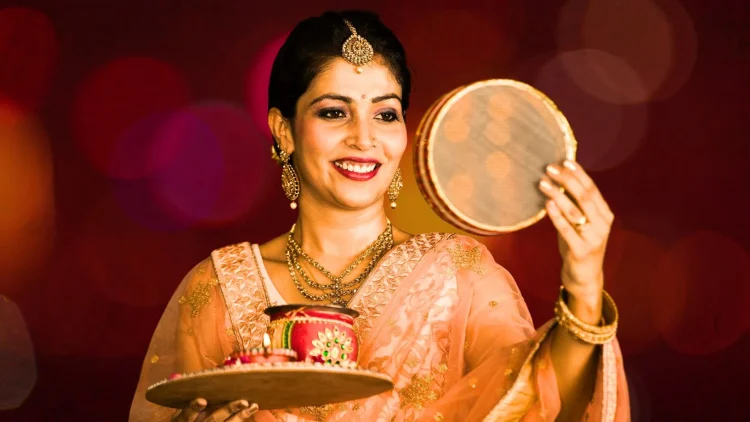Karwa Chauth is one of the most celebrated Hindu festivals in India, observed with great devotion, love, and enthusiasm. It falls on the fourth day of the Kartik month according to the Hindu lunar calendar, usually in October or November. The festival celebrates the eternal bond of love, commitment, and togetherness between husband and wife. From pre-dawn meals to moonrise rituals, Karwa Chauth is filled with meaningful traditions, cultural practices, and family bonding. Let’s explore the complete Karwa Chauth rituals and rules associated with this festival.
Karwa Chauth Rituals: Complete Guide of Karwa Chauth Fast Rules

1. Preparations Before the Fast (Before Sunrise)
The festival begins before dawn with several preparations:
Sargi (Pre-Dawn Meal): Sargi is prepared by the mother-in-law and includes fruits, sweets, dry fruits, nuts, coconut, milk, and traditional dishes. It provides sustenance for the fasting woman throughout the day. Mother-in-law gifts (Baya) are given to the daughter-in-law along with Sargi. (Also Read: What is Sargi? What is included in Sargi)
Bath and Dressing Up: Women take a ritual bath, wear traditional attire (saree or lehenga), and wear jewelry and bangles. If you like mehendi, apply it on hands (full hand and back hand) or feet. (Also Read: Karwa Chauth Mehendi Designs)
Home Decoration: Homes are cleaned and decorated to mark the auspicious day.
2. Karwa Chauth Fast Rules
Who Observes: Traditionally, married women observe the fast, while unmarried and newly married women may also participate with slight modifications.
Duration: The fast begins after Sargi and continues from sunrise to moonrise.
Abstinence: Women refrain from eating and drinking water (Nirjala fast for married/newly married women).
Positive Mindset: Maintain positive thoughts, patience, and devotion throughout the day. Avoid conflicts and negativity.
Exceptions: Women who are pregnant, ill, or lactating may break the fast if necessary.
3. Karwa Chauth Daytime Rituals
Household Chores: Perform light work; avoid strenuous activity.
Prayer & Meditation: Spend time praying to Goddess Parvati and Lord Shiva for marital happiness and longevity of the husband.
Community Gatherings: Some women fast together with friends or relatives, sharing stories and experiences. Some women also play games like Tamboola and others.
Also Read: Karwa Chauth Quotes & Wishes for Husbands and Wives
4. Evening Pooja (Karwa Chauth Puja Ritual)
Pooja Thali: Decorate a plate with diya (lamp), sweets, fruits, water, sindoor, and an earthen Karwa pot.
Katha Recitation: Recite the Karwa Chauth Katha, narrating the significance of the fast and blessings for a happy married life.
Offering Prayers: Women worship Goddess Parvati, Lord Shiva, and the Karwa pot, often tying a thread on their husband’s wrist as a blessing ritual.
5. Moonrise Karwa Chauth Rituals
The moon viewing and breaking of the fast is the most awaited moment:
Viewing the Moon: Women look at the moon through a sieve (chalni) or dupatta, symbolizing focus and purity.
Looking at Husband: After moonrise, women turn to look at their husband’s face through the sieve.
Offering Water (Arghya): Water is offered to the moon, and husbands give the first sip of water or juice to their wives.
Breaking the Fast: Women then start with light foods and fruits, followed by a full meal with the family.
6. Karwa Chauth Rituals for Unmarried Women
Objective: Fasting is done to pray for a suitable husband and happy married life.
Ritual Differences:
Wear new clothes without heavy makeup.
Apply henna on palms for auspiciousness.
Do not perform Nirjala fast; fast only without food.
Do not use Sieve for moon viewing.
7. Rituals for Newly Married Women
First Fast: Requires a Nirjala fast with full abstinence from water and food until moonrise.
Gift Exchanges:
Newly married women receive Baya (gifts) from mother-in-law.
Woman’s family may send gifts to husband’s family.
Husbands often send gifts or tokens of love.
8. Gifts & Celebrations
Exchanging gifts is an integral part of Karwa Chauth and symbolizes love, blessings, and appreciation. The tradition strengthens family bonds and adds a joyful touch to the celebration.
Mothers-in-law to Daughters-in-law: The mother-in-law presents Sargi before sunrise and often gifts clothes, jewelry, or sweets as a token of blessings.
Husbands to Wives: After the fast is broken at night, husbands surprise their wives with thoughtful gifts to express love and gratitude for their devotion.
Popular Karwa Chauth gifts include sweets, cakes, flowers, jewelry, personalized presents, and decorative items – each carrying a touch of affection and festivity.
10. Tips for Observing the Fast Safely
Stay hydrated before the fast by drinking plenty of water during Sargi.
Include complex carbs and proteins in Sargi for energy.
Avoid fried foods, excessive sweets, tea, or coffee to prevent acidity or bloating.
Consult a doctor if you have health concerns.
Karwa Chauth is more than just a fast—it’s a celebration of love, devotion, and marital harmony. From ancient legends to modern gift exchanges, every ritual emphasizes the strength of relationships and the joy of togetherness. Whether you are married, newly married, or unmarried, observing Karwa Chauth is a beautiful way to honor love, tradition, and family bonds.